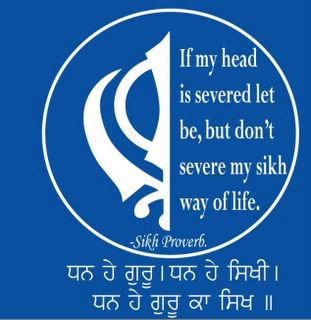Dare Devil performance of the Khalsa....

The 307th anniversary of establishing Khalsa just went by so I am posting a Sakhi of Dare Devil performed by Khalsa in the 18th century.
Two brave saint soldiers are famous for their daring deed of cutting the head of an evil man, Massa Rangar who was desecrating the Golden Temple in 1740. These two Lions were Bhai Sukha Singh who belonged to the village Mari Kamboki and Bhai Mehtab Singh who belonged to the village Meeran Kote, both in the district of Amritsar.
Zakaria Khan, irritated by the Sikhs' resistance and his failure to subdue them, obtained the orders from Nadar Shah Durrani to annihilate the Sikhs from Punjab. Accordingly, it was advertised that if a person helps to catch or kill a Sikh, he would be rewarded handsomely. To steal and rob from Sikhs was made legal.
These orders of the government motivated many greedy people to become traitors. Cart-loads of severed heads of the Sikhs were sent to Lahore by such people to win government rewards. These traitors included Harbhagat Niranjania Chowdhary (a petty village official) of Majitha, Chowdhary of Noshaira Pannu, and Chowdhary Massa Rangar of Mandiali. Of all these men, Massa was the most notorious and in charge of the Amritsar circle. He desecrated the Golden Temple by smoking and drinking inside there while watching dancing girls. Armed watchmen were posted around for his safety.
When the Sikhs in Bikaner heard about the desecration of their holy place of worship they became very angry. Bhai Sukha Singh and Bhai Mehtab Singh decided to go to Amritsar and stop the desecration. When they reached the gates of the city, they obtained baked-clay pots and broke them into small pieces. The broken clay pieces were rounded to look like coins of those days. The "coins" were put in small bags and the Sikhs, dressed as village land revenue collectors, were ready to perform their task.
During those days, collectors would obtain revenue from the people of the villages in their charge and deposit the money with the local administrator who would send the collections to Lahore. The land revenue was paid in the form of coins of different values.
When the Sikhs reached the Golden Temple they passed by the watchmen without anyone even lifting a finger against them. The watchmen assumed by seeing the "coin bags" that the two village collectors were going to the Chowdhary for depositing their money. When the Sikhs got inside the Harimandar Sahib the bags were put before Massa, who was drunk and watching the dances of the girls. When he bent to feel the "coins" in the bags, a sword fell like lightning and cut off his head which was picked up by the Sikhs. Before the people inside or outside the Temple could compose themselves and know what had happened, the Sikhs on their horses had vanished. The job was performed so successfully that it brought great shame to the administration and the police of Amritsar.
The Nawab of Lahore got extremely angry and wanted to punish the Sikhs severely to take revenge of that insult. It was in 1745 when Mehtab Singh came to his village, that a traitor reported the matter secretly to the government. The police came quickly and surrounded the village before Bhai Mehtab Singh could go back to the forest. He was caught and brought to Lahore and was murdered by being crushed between rotating wheels with sharp teeth (charkhari).
Bhai Sukha Singh attained his martyrdom in 1753 while fighting the Mughal army on the banks of the river Ravi.
The daring deeds of Bhai Sukha Singh and Bhai Mehtab Singh tell us how brave and smart the Khalsa saint soldiers can be.
Source : Sikhism.com

0 Comments:
Post a Comment
<< Home